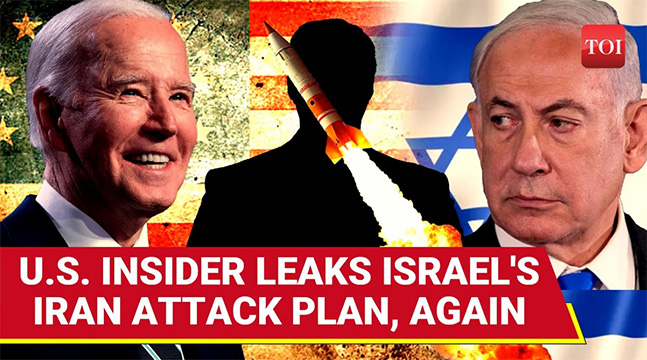
"Middle East Spectator," is a pro-regime Telegram outlet based in Tehran, as all media channels based in Tehran are – by law. Last week, Middle East Spectator leaked two sensitive intelligence documents. The documents originated in the US National Geospatial-Intelligence Agency (NGA), and the information pertained to Israel's preparation to retaliate for Iranian missile attacks.
Middle East Spectator claims it is an independent operation in Tehran. It says it got the documents from an “informed source in the US intelligence community.” If we take this at face value, then a source in the intelligence community contacted the Spectator and shared the two documents. To further clarify, in a subsequent post Spectator says the source was in the US Defense Department, stresses Stephen Bryen, a former U.S. Deputy Under Secretary of Defense.
It is extraordinarily valuable material that Iran can, and likely will, use to prepare its defenses.
One of the two leaked documents is classified above top secret. That document is headlined as NOFORN which means that the document cannot be shared with foreign governments. Assuming that the documents were not shared with allies (such as the Five Eyes group that have extraordinary access to US intelligence information), that information strengthens the claim made by the Spectator, that the leak came from United States persons or organizations.
The documents describe an Israeli "large force employment exercise" on the 15th and 16th of October. The document was published on Telegraph by the Spectator on the 18th.
Whoever leaked it to Tehran was warning that an Israeli strike was imminent. It also told the Iranians the type of weapons that would be used and probable targets, the latter being mainly Iranian air defense sites and long range radars.
How do we know? The two documents provide highly detailed information on Israeli Air Force preparations for a strike and describes in detail activities at three Israeli air bases subject to massive US surveillance.
There is more. The lesser classified document (secret level) discussed Israel's Jericho II medium range ballistic missiles, which are believed to be a critical part of Israel's nuclear deterrent. The missile is solid fueled and can be silo or TEL-based. The document’s context means that the US accepts Israel has nuclear weapons, although the US has never officially acknowledged that before. The document reveals that Israel may have dispersed the Jericho missiles to prevent them being targeted by Iran. It also says that the US has not detected any preparations by Israel of its Jericho II missiles and concludes any nuclear strike by Israel is unlikely.
There can be no doubt that the leak of geospatial-origin intelligence has brought significant harm to Israel. It is also likely much more sensitive intelligence was leaked to the Iranians, which Iran may be protecting from public disclosure. Some releases on the Spectator channel admit as much.
Why would the Iranian government (either via Spectator or by giving permission to Spectator) leak ANY of the information?
Some speculate it was to convince Israel that the retaliation plan was known to Iran – thus deterring Israel from an attack that the Iranian government REALLY didn’t want to face. Second, perhaps, it was to warn (boast?) that Iran was being supplied with secret information by the United States, making Israel worry about what else had been compromised.
Consider this.
The Iranian leak was published on October 18th. On the 19th, an alleged Hezbollah-origin drone attacked Israeli Prime Minister Benjamin Netanyahu's private home in Caesarea near the coast. Accurately targeting Netanyahu's home required “scene matching,” as any drone from Lebanon, Syria or Iraq would likely have been outside of radio control communication. “Scene matching” would require significant intelligence preparation.
Was there confidence Netanyahu would be at home during the attack? Or confidence that he wouldn’t be – striking the house knowing he wasn’t there would be another way of telling Israel what Iran knows without facing the retaliation that would surely follow an actual assassination.
All of this is likely to cause a significant reassessment in Israel. At minimum, the Israelis will have the opinion that US intelligence is unreliable and penetrated. Beyond that, some will understand the US to be overtly hostile and acting against Israel.
After the drone attack, the Prime Minister received phone calls from heads of state and from former President Trump and US House Speaker Mike Johnson. Neither President Biden nor Vice President Harris called.
One suggestion being floated is that maybe the documents were hacked. But such sensitive information is not only carried on classified channels, but it is also encrypted, making hacking less likely to yield useful results. For the record, there are no public reports of any hacks of US security information.
It isn't clear what Israel will do. It would be reckless to retaliate now that at least some of Israel's plans and preparations have been leaked – which was the whole idea. Israel had already reportedly agreed with the US not to strike either Iran's oil and nuclear facilities. Will that agreement hold now, or will Israel consider the agreement void?
read more in our Telegram-channel https://t.me/The_International_Affairs

 11:10 22.10.2024 •
11:10 22.10.2024 •






















